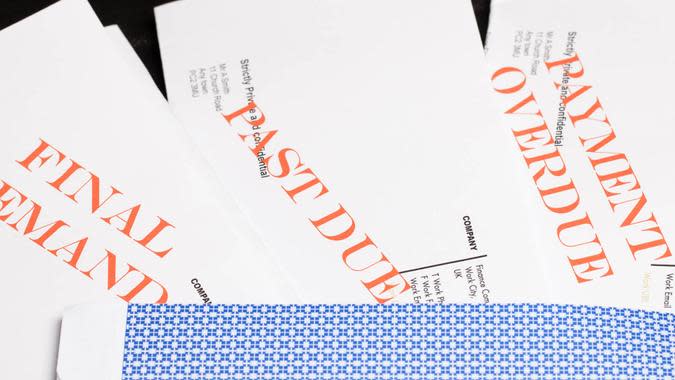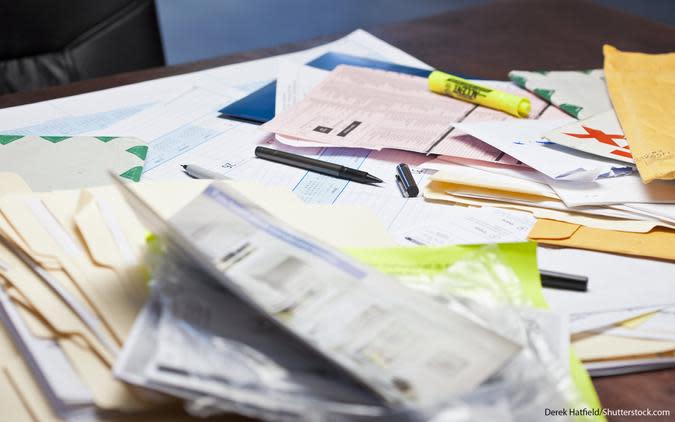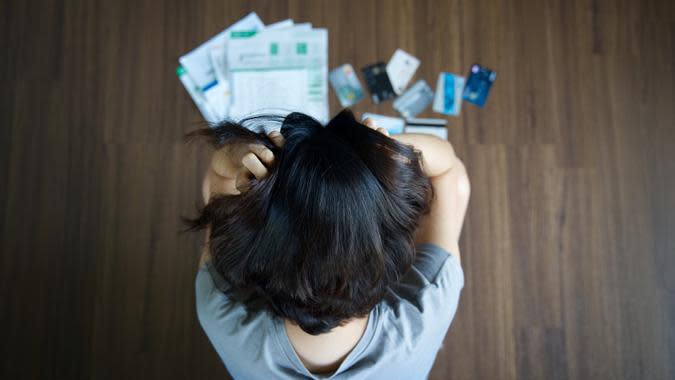The Top Reasons You Can’t Get Your Finances in Order — And How To Fix Them

It might seem like no matter what you do, you can't get your financial life in order. Although this may be due to extenuating circumstances, it might also be that you're just making the same common missteps over and over again.
The Future of Finances: Gen Z & How They Relate to Money
Do You Have a Tax Question? Ask a Tax Pro
Read: 3 Ways Smart People Save Money When Filing Their Taxes
I spoke to experts to find out some of the most common reasons people struggle with their finances -- plus, how to fix these issues so that you can break the cycle and get back on track.

You're Avoiding Your Financial Issues
"Denial and procrastination" are often the main factors that keep people from getting their finances in order, said Bobbi Rebell, CFP, personal finance expert at Tally.
"So many people just avoid dealing with their finances," she said. "In some cases, they literally are not opening the envelopes with the bills, or if they are paperless, they are just not logging on."
How To Fix It: "The truth is that you can't put your finances in order until you know the numbers you are dealing with," Rebell said. "In many cases, the truth is not nearly as dire as feared. By looking at the actual situation, you can start to put together a plan."
Take Our Poll: How Do You Think the Economy Will Perform in 2023?

You're Disorganized
Perhaps the reason your finances aren't in order is that they literally are not in order.
"Disorganization can sink your finances," said Gerri Detweiler, expert financial service and fintech consultant. "When you aren't organized and don't plan, you may miss due dates, pay for things you don't need like subscriptions on autopay, and find yourself chronically behind financially."
How To Fix It: "Create an organizational system that works for you," Detweiler said. "For some, it may be a paper-based planner, while others can benefit from online systems or apps that help you plan and organize. Make it a habit to check in weekly at a minimum."

You're Living Above Your Means
"One of the biggest money mistakes in America is living on more than you make," said Rachel Cruze, personal finance expert and author of "Know Yourself, Know Your Money." "Racking up credit card debt and buying a car you can't afford to keep up with a lifestyle you think you need will keep you living paycheck to paycheck."
Even small expenses can add up and lead to debt.
"One area of spending that's easy to justify is grabbing coffee on your way to work or grabbing meals on the go," said Chalmers Brown, lead solutions architect at Unit21. "Five dollars here and $10 there doesn't seem like much, but add that up at the end of the month and you may be surprised to see how much of your paycheck goes towards something that will be there and gone in a few minutes."
How To Fix It: "You have to take debt off the table in order to win with money," Cruze said.
This might mean downgrading your lifestyle so that you don't continue to rack up debt. You might drive an older car, downsize your home or start small with cooking at home more and eating out less.
"All of these sacrifices will help to free you up to get out of debt and build wealth," she said.

You're in Credit Card Debt
If you've been consistently living above your means, you probably have credit card debt that you can't seem to get rid of. Even if you keep transferring debts to new credit cards with promotional interest rates, you need to have a plan to eventually pay this debt off.
"If you don't have a consistent plan to pay off a large balance before the promotional period expires, you could be left with a large balance accruing very high interest rates," said Charles Liu, director of creator financial planning & analysis at SoundCloud.
How To Fix It: "At Ramsey Solutions, we recommend getting out of debt using the debt snowball," Cruze said. "This is where you list all of your debts, smallest to largest, regardless of interest rate. You're going to attack the smallest debt with all that you can and make minimum payments on the rest. Once you have the smallest debt paid off, roll that payment to the next one."
"What we've learned is that debt is not an income problem. It's a behavior problem," she continued. "Having these small wins along the way helps to create momentum and keep you going."

You're Not Automating Your Savings and Investments
If you're living paycheck to paycheck, you're probably not making regular contributions to your savings and investment accounts, which will hurt you in the long run.
"Relying on willpower alone to save as much as you intend on a regular basis is like asking someone to avoid dessert 365 days a year," said Janet Alvarez, personal finance expert at Wise Bread. "Despite our best intentions, it's unlikely to happen."
How To Fix It: "Set auto-transfers from checking to savings, set your 401(k) plan to adjust upwards by 1% of contributions yearly and download apps such as Acorns that will help you invest automatically," Alvarez said.
Since this money won't even hit your checking account, you won't miss it and will learn to live off less.

You're Not Investing at All
Not automating your investments is a mistake, but not investing at all is even worse. Leanna Devinney, vice president and branch leader at Fidelity Investments, said that this is a common reason people can't get their finances order. In addition, some people who do invest will cash out too quickly.
"Market volatility can be scary, but instead of keeping an eye on the long-term, some people panic and react to market events by withdrawing their savings from their investments, which can have a negative impact on their ability to retire or pursue their financial goals," she said. "Other people don't invest at all because of fear and the unknowns involved."
How To Fix It: "One way to break this cycle is to spend some time with an advisor going through how your money is invested, and making sure there are contingencies built into your investment plans that can help address the need for liquidity if an emergency comes up, protection and growth," Devinney said. "Making sure certain safeguards are in place can help provide greater peace of mind."

You're Putting All Your Eggs in One Basket
"One bad financial habit I see often is the tendency for people to put all their eggs in one basket -- many people only look to the stock market when they're ready to start investing for the future," said Kurt Carlton, co-founder of New Western Acquisitions. "They forget about the importance of diversifying their portfolio to mitigate risk."
How To Fix It: Ensure you're invested in a good mix of assets, including mutual funds, stocks, bonds, real estate and retirement savings accounts.

You're Leasing Instead of Buying
"In order to have the newest and nicest things like technology, cars and furniture, some people will lease these items instead of buying something they can afford," said Stephanie Jones, editor-in-chief of Personal Branding Blog. "Over time, you will end up paying more than the item was worth in the first place."
How To Fix It: "Instead of essentially 'renting' these items, buy something you can afford and save up for what you really want," Jones said.

You're Easily Thrown Off When Things Don't Go According to Plan
Even if you do have a financial plan in place, it's almost certain that life will throw a wrench into those plans every once in a while.
"The top things that throw people off financially are often unexpected setbacks, such as losing a job, caregiving and medical debt," said Meredith Stoddard, vice president of life events planning at Fidelity Investments.
How To Fix It: "When you get thrown off course, it's important to not give up entirely," Stoddard said. "Dust yourself off and start over again. Finances are an area where persistence and resilience really pay off over time. Your future self will thank you for the effort you made, even if it's less than perfect."

You Just Don't Know How To Get Your Finances in Order
"One very valid reason you can't get your finances in order is that no one ever taught you how to do that," said Stephen Dalby, founder and executive chairman of Gabb Wireless.
How to manage your finances is not a subject that's typically taught in school, so if you haven't done your own research, you might not know how to start.
How To Fix It: "There is no shame in taking personal finance classes as an adult," Dalby said. "Whether it be the Dave Ramsey method or something else, there are so many options for taking courses that will help you take control of your finances in a healthy way."
You may also consider reaching out to a financial advisor. Whatever you choose, getting educated about personal finances can be especially important if you are navigating money issues with a partner.
"If you have a spouse or significant other involved in the finances, you both need to be on the same page," said Misty Larkins, president of Relevance. "To help, take a finance class together or involve a financial advisor who can help be an objective third party and guide you both in making wise financial decisions."
More From GOBankingRates
Gabrielle Olya contributed to the reporting for this article.
This article originally appeared on GOBankingRates.com: The Top Reasons You Can’t Get Your Finances in Order — And How To Fix Them